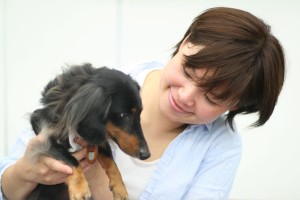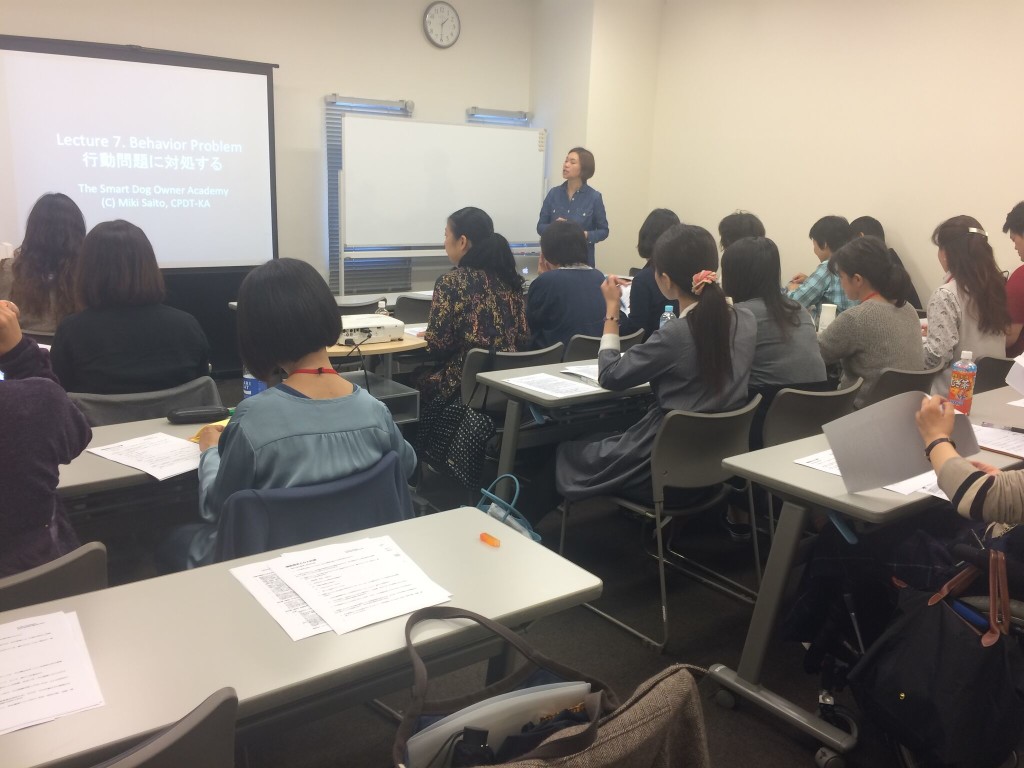Spotlight on a Trainer – Miki Saito
 I came to know Miki as a wonderful resource via my work with deaf dogs. Miki has provided fantastic training advice for blind dogs and our audience/questions and answers often overlapped. Miki lives in Japan and has published in both English and Japanese!
I came to know Miki as a wonderful resource via my work with deaf dogs. Miki has provided fantastic training advice for blind dogs and our audience/questions and answers often overlapped. Miki lives in Japan and has published in both English and Japanese!
What was your route to positive reinforcement training?
I learned about dog training at first and got certification of dog training instructor at one of associations in Japan which use positive reinforcement. The association says their training is based on “science” and “humane”. But I had doubts about their ways and what founders say. And I had to find new ways to make it easier for blind dog to learn new behaviors and perform those without fear. It’s because my dog went blind at 6-yrs. I tried to find good ways to help and teach them but there were very few information and also those weren’t helpful for me. I started learning about behavior analysis and animal centered training. I learned English in order to understand the information from overseas. I got certification of CCPDT and tried to contact those who share good information on the internet. Luckily, I met Dr. Susan Friedman, Ken Ramirez and other great trainers!!! I think training is to enrich the lives of animals and necessary the point of view of animals. My such opinion was denied in the association I learned. But when I looked at other countries than Japan, there are lots of people who have the same opinion as me! The fact encourage me also now!
Were you always interested in science or did behavioral science peak your interest at a later time & how?
I am ALWAYS interested in science! The more I know the behavior analysis, the more I get interested more in it.
Are there specific skill sets from previous career paths which have aided you in your current role?
I used to do a various of jobs, PR of apparel industry, technical and consumer support of Apple, technical writer of semiconductor of NEC, web planner. So I can use computer and internet easily and create my website, simple graphics, business card and so on by myself. The knowledge of internet marketing is also helpful.
What is one piece of advice from someone that you consider a “mentor” that you’d like to share?
“There are no problem behaviors: there are problem situations, in which behavior is just one element.” (Susan Friedman, Ph.D)
What is your favorite part of your day?
When my dog Nono was alive, I love snuggling up to her. But she crossed the rainbow bridge about 4 month ago. I can’t have such time now. I miss her.
What do you find to be the most challenging in working with people & animals?
It’s very hard for people to have new point of view. For example, seeing what happens without labeling.

What are some key skills required for animal trainin?
- Training plan based on constructional approach
- Seeing what really happens without labeling
- Mechanical skills
- Understanding frustration of being in extinction (operant) contingency
Anything else you’d like me to know/mention.
I’d like to thank you to all trainers including you Terrie and professors who accepted me, became friends, and shared their information with me to educate Japanese people. If I couldn’t meet them, I would have given up keeping learning and teaching, and my students couldn’t have had great information for animals in their care.
For more about Miki, you can find her website, youtube channel, and Facebook information here:
http://BlindDogTraining.com (English & Japanese)
http://MarkandReward.com (Japanese)
http://www.youtube.com/tdfn (English)
https://www.facebook.com/mikisaitocpdtka/ (Japanese)
A heartfelt thanks to Miki for sharing more about her journey to positive reinforcement training!
Note: For anyone out there who is looking to become a certified, professional, positive trainer, come and join me in Miami! Applications being accepted now: https://www.karenpryoracademy.com/dog-trainer-professional/national/miami-fl
